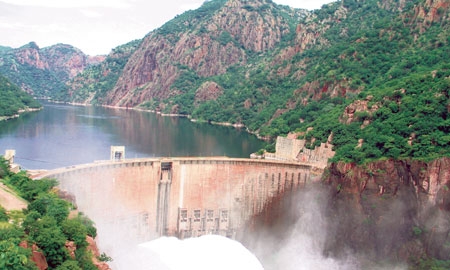When Portugal finally relinquished control of the Cahora Bassa Hydroelectric Dam (HCB) in 2007 to its former colony, Mozambique’s President Armando Guebuza told a cheering crowd that “the last mark of 500 years of foreign domination in our country has finally been removed” and declared: “Cahora Bassa is ours.”
Completed in 1974, the same year Portugal withdrew from Mozambique, the imposing structure was conceived as Portugal's grand colonial project; the importance to Mozambicans of gaining its full ownership cannot be underestimated, not just as a source of political affirmation and national self-esteem, but also as a nationally owned engine to power the country’s socio-economic advancement.
Located on the Zambezi River by the town of Songo in the mineral-rich western province of Tete, the dam is close to new energy-hungry mining projects in the north tapping new discoveries of coal, gas and heavy mineral sands by major operators such as Brazil’s Vale and Australia’s Rio Tinto.
State-owned HCB is self-financing, with electricity generated by the dam’s underground power station also going elsewhere in the SADC via power-purchase agreements with countries such as Zimbabwe and South Africa. “Around 20 per cent of its production capacity stays in Mozambique, which represents a very high rate of growth because in 2007 we were supplying only 13 per cent,” says Paulo Muxanga, Chief Executive of HCB. “In terms of quality, we have been performing well: our power outages are few and our production is about 99 per cent reliable.”
A new $800 million Hydro Power Station project, in the north bank of Cahora Bassa Dam, called the Central North, is under feasibility studies. It is expected to have five years duration and will add 1,500 MW to Cahora Bassa’s 2,075 MW current generation capacity.
Plans to construct more sub-stations across the country will expand and strengthen access to the national grid and raise living standards nationwide.
“We are a national company from the ground up. We produce raw materials and we have nearly 670 employees, of whom 660 are Mozambicans,” says Mr Muxanga. “We are backing Mozambique to become self-sufficient in terms of training; its human capital needs to be developed by national institutions.” Proof of this belief is in HCB’s partnershipwith the Songo Higher Polytechnic Institute for training.
Four years ago it invested $2 million in the institute to improve working conditions, construct a residence for students and also several classrooms “Since the beginning, but especially after regaining full control of HCB, our first responsibility (after achieving the desired production levels) has been to improve social conditions for not only our employees but also for the communities,” says Mr Muxanga.
“We take measures in almost all areas: in education, health, sports, culture, etc. We are present in all the most important areas because we believe that not only material things matter [...] HCB is the pride of Mozambique.”

0 COMMENTS